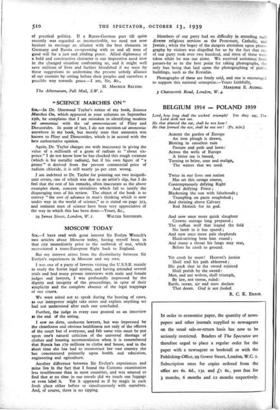MOSCOW TODAY
Strt,—I have read with great interest Sir Evelyn Wrench's two articles about Moscow today, having myself been in that city immediately prior to the outbreak of war, which necessitated a trans-European flight back to England.
But my interest arises from the dissimilarity between Sir Evelyn's experiences in Moscow and my own.
I was one of a party of lawyers visiting the U.S.S.R. mainly to study the Soviet legal system, and having attended several trials and had many private interviews with male and female judges and lawyers, I was profoundly impressed by the dignity and integrity of the proceedings, in spite of their simplicity and the complete absence of the legal trappings of our courts.
We were asked not to speak during the hearing of cases, as our interpreter might take notes and explain anything we had not understood after each one concluded.
Further, the judge in every case granted us an interview at the end of the sitting.
I saw no dirty, unshaven lawyers, but was impressed by the cleanliness and obvious healthiness not only of the officers of the court but of everyone, and felt some rein must be put upon one's natural criticism of the universal shortage of clothes and housing accommodation when it is remembered that Russia has 170 millions to clothe and house, and in the short time she has had to reconstruct her vast country she has concentrated primarily upon health and education, engineering and agriculture.
Another difference between Sir Evelyn's experiences and mine lies In the fact that I found the Customs examination less troublesome than in most countries, and was amazed to find that at no time in our travels did we touch our luggage or even label it. Yet it appeared as if by magic in each fresh place either before or simultaneously with ourselves. And, of course, there is no tipping. Members of our party had no difficulty .in attending such diverse religious services as the Protestant, Catholic, and Jewish ; while the bogey of the dangers attendant upon photo- graphy by visitors was dispelled for us by the fact that one of our party took over two hundred, and most of these were taken while he was out alone. We received assistance front passers-by as to the best point for taking photographs, the only ban being that laid upon the photographing of publh: buildings, such as the Kremlin.
Photographs of these are freely sold, and one is encouraged to support this national enterprise.—Yours faithfully,
MARJORIE E. Aunsuc.
3 Chatsworth Road, London, W. 4.










































 Previous page
Previous page